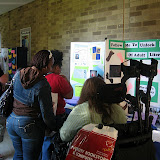11/19/05
Welcome Everyone! We are here today to celebrate the 10th Anniversary of the Literacy Roundtable and to call attention to the suppression of voices in our society. This event was organized by the ABC’s of Literacy Committee, which is a project of the Literacy Roundtable and LIFT, Missouri’s literacy resource center in conjunction with the Literacy For Social Justice Teachers Research Group. One of our themes this year is Education as a Human Right and part of that theme is talking about intellectual freedom.
Many people think of book banning as something that occurred 100 years ago or occurs in other countries, and they do not realize that it is something that happens all the time in communities in USA. Every month there are books challenged in school and public libraries across our country. People who challenge books often have really good intentions: they want to protect others, often children, but also adults, from difficult ideas and information. However, the first amendment gives us the right to freedom of speech which means that one group cannot decide for everyone which information gets shared and which information is silenced.
Throughout history, people from different beliefs (both conservative and radical) have attempted to suppress the words of people who disagree with their beliefs. The American Library Association has collected lists of these books that are challenged every year and has compiled several lists identifying which books are the most challenged over time. Here is a list of the most challenged books of 2000-2007.
Today we have chosen some of these very books to donate to the library and 3 adult education programs in the St. Louis Metro Area. Our reasons are two fold.
One, we want to promote the idea that everyone’s voices should be heard. People have tried to suppress the voices of these authors by preventing their books from being in libraries and schools in the United States. But also, every day, there are thousands of voices here in our community that will never be heard because they do not have the skills to write their words down. The written word is very powerful, as evidenced by the fear it promotes in people, and if people do not have the ability to write and to read, then they do not have the ability to function fully in our society. These books that have been challenged often promote ideas that are difficult and complex. These books promote the discussion of these ideas and address complicated issues in our society. When people have the opportunity to discuss complicated ideas and complex situations, they then are better able to apply that reasoning process to other aspects of their lives.
The other reason why we chose these books is to encourage people to understand that in order for people to become better readers, to become more literate, they have to have a choice about what they read. There are multiple studies that show that people who have the opportunity to read their choice of reading material everyday, that they become stronger readers and if they are interested in the subject, that they can actually read at a higher level than they normally would. Often books that are challenged are books that describe lives and experiences that are not “rosy pictures”, but for many of us, our lives are not always rosy and perfect either – people need access stories that relate to our own experiences as well as stories that portray a different experience.
Education is a human right, a right that is not dependant on the laws or beliefs of any country. In order for us to effectively make this a reality for all students, no matter what their age, we have to do better. The impact of adults learning to read is significant not only in their own lives, but also in the lives of their children and grandchildren. The single best indicator of whether a child will succeed in school is the education level of their primary caregiver, often the mother. If we wish to break the intergenerational cycle of illiteracy, we need to focus on educating adults as well as children.
Without further ado, I give you Carlotta Algee Stancil, the chairperson of the Literacy Roundtable. Carlotta will be presenting the books today to the St. Louis Public Library – Julia Davis Branch, The St. Louis Public Schools Adult Education and Literacy Program, the Lewis and Clark Community College Adult Education and Literacy Program, and the St. Louis Community College at Meramec Adult Education and Literacy Program.
Friday, November 21, 2008
Thursday, November 13, 2008
Banned Books Event 11/19/08
Banned Books Donated
On November 19, 2008 at 10:30 am the Literacy Roundtable in commemoration of its tenth anniversary will donate a selection of books that have been banned or formally challenged to the Julia Davis Library. The Literacy Roundtable is a consortium of literacy providers throughout the St. Louis-Metro East area.
An additional selection of banned books will be donated to three adult education classrooms in the greater metropolitan area. To highlight the nature of the banned books, they will be wrapped in brown paper, hiding their titles. The titles come from the American Library Association’s Top 100 Banned/Challenged Books in 2000-2007 list.
A community forum on intellectual freedom will follow immediately after the donation in the Julia Davis auditorium. This is the first in this year’s series of events initiated by the ad hoc ABC’s of Literacy Committee, which focuses this year on education as a human right. The committee has held a series of forums and conventions on literacy issues for the past five years often meeting at the Julia Davis Library.
In conjunction with the Literacy Roundtable and the Literacy for Social Justice Teacher Research Group, the ABC’s of Literacy Committee’s next event will be a selected reading of banned books on December 8 from 6-8 pm at Legacy Books and Café, 5429 Delmar Avenue.
On November 19, 2008 at 10:30 am the Literacy Roundtable in commemoration of its tenth anniversary will donate a selection of books that have been banned or formally challenged to the Julia Davis Library. The Literacy Roundtable is a consortium of literacy providers throughout the St. Louis-Metro East area.
An additional selection of banned books will be donated to three adult education classrooms in the greater metropolitan area. To highlight the nature of the banned books, they will be wrapped in brown paper, hiding their titles. The titles come from the American Library Association’s Top 100 Banned/Challenged Books in 2000-2007 list.
A community forum on intellectual freedom will follow immediately after the donation in the Julia Davis auditorium. This is the first in this year’s series of events initiated by the ad hoc ABC’s of Literacy Committee, which focuses this year on education as a human right. The committee has held a series of forums and conventions on literacy issues for the past five years often meeting at the Julia Davis Library.
In conjunction with the Literacy Roundtable and the Literacy for Social Justice Teacher Research Group, the ABC’s of Literacy Committee’s next event will be a selected reading of banned books on December 8 from 6-8 pm at Legacy Books and Café, 5429 Delmar Avenue.
Subscribe to:
Posts (Atom)

